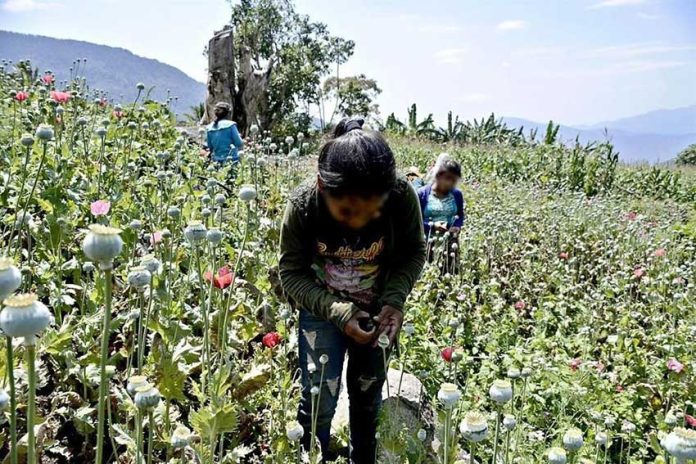Prices for Mexican opium gum plummeted by as much as 80% last year due to the rise in demand for the synthetic opioid fentanyl among United States drug users, according to an independent study.
After carrying out field work in the states of Guerrero and Nayarit, the Network of Researchers in International Affairs (Noria) said that prices paid to opium poppy farmers for the gum – the raw material for heroin – had fallen from 20,000 pesos (US $1,050) per kilo in 2017 to between 6,000 and 8,000 pesos (US $315-$420) last year.
However, Noria added that some farmers had mentioned “rumors of prices going even lower, around 4,000 pesos (US $208),” which equates to an 80% decline on 2017 prices.
The report No More Opium for the Masses said that “the dramatic upswing in fentanyl use in the United States is generating a parallel and rapid collapse in the price offered for raw opium in rural Mexico.”
Fentanyl, mainly exported to the United States from China, is 30 to 50 times stronger than heroin, Noria said.
The increasing demand for the drug caused the net value of opium production in Mexico to fall to an estimated 7 billion pesos (US $367.4 million) last year compared to around 19 billion pesos (US $1 billion) in 2017.
The decline in opium income, Noria said, “is causing a series of very serious secondary economic effects” in communities that are dependent on the cash crop.
“Many local peasants are not even making back their investment on the product; many families are losing their sole source of income; the amount of money flowing into the local economy has dried up almost completely; and many are leaving their villages for temporary agricultural work or even to work directly for the cartels,” the report said.
“The Mexican opium crisis looks like it might ruin the poorest areas of rural Mexico for good.”
To provide “a way out” for Mexico’s opium producers, Noria considered two solutions that have been proposed by politicians and non-governmental organizations, among others.
“The first widely-touted solution to the poverty and violence bound up with Mexico’s drug war is the legalization and regulation of opium production for medicinal use. Farmers would cultivate poppies and sell their opium harvests to private pharmaceutical companies, who would then convert the opium to morphine and use it for pain relief in Mexican hospitals,” the report said.
Noria noted that Guerrero Governor Héctor Astudillo and Interior Secretary Olga Sánchez, among others, have suggested that legalization could not only bring economic benefits but also help to stem violence.
However, Noria added that “we do not see legalization as a silver bullet for the problems of Mexico’s opium-growing regions,” explaining that “there are legal barriers to the change” and that “the link between legalization and decreasing violence seems overly simplistic.”
It also said that “Mexico’s capacity for opium production greatly exceeds the country’s demand for legitimate medical use, which suggests that the legalization of opium for medical use in Mexico would not provide adequate demand to offset the economic losses suffered by current producers.”
The second solution was “crop substitution.”
The research organization acknowledged that President López Obrador has “suggested that poppy cultivation in Guerrero could be substituted for maize, in order to provide local peasants with an ‘honest’ way of sustaining themselves and their families.”
However, Noria said that “in countries where crop substitution programs have been implemented, their success has also been limited by one simple fact: illicit drug crops tend to command a higher price, thanks to the laws of international supply and demand, than their legal alternatives.”
Despite the concerns, “if properly researched and managed, both policies could be introduced relatively cheaply and effectively,” Noria said.
“Initially at least, they would help to loosen the grip of organized crime groups on the regions, and tie farmers to licit international markets. In combination with other broader security policies, they could even succeed in integrating these marginalized areas into the country for good,” the report concluded.
Source: Reforma (sp)
